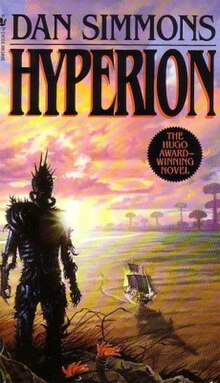Hyperion (Simmons novel)

Paperback cover
|
|
| Author | Dan Simmons |
|---|---|
| Cover artist | Gary Ruddell |
| Country | United States |
| Language | English |
| Series | Hyperion Cantos |
| Genre | Soft science fiction/Space opera novel |
| Publisher | Doubleday |
|
Publication date
|
1989 |
| Media type | Print (hardback & paperback) |
| Pages | 482 pp (mass paperback edition) |
| Awards | Locus Award for Best Science Fiction Novel (1990) |
| ISBN | (1st ed. hardcover) |
| OCLC | 18816973 |
| 813/.54 19 | |
| LC Class | PS3569.I47292 H97 1989 |
| Followed by | The Fall of Hyperion |
Hyperion is a Hugo Award-winning 1989 science fiction novel by American writer Dan Simmons. It is the first book of his Hyperion Cantos. The plot of the novel features multiple time-lines and characters. This book is succeeded by the 1990 science fiction novel The Fall of Hyperion by the same writer.
In the 27th century, humanity has spread across the galaxy, first aboard "Hawking drive" ships and then through "farcasters", which permit nearly instantaneous travel regardless of distance. However, many planets are of little economic interest and disconnected from the farcasters. These planets can only be reached by spaceship, resulting in time dilation effects which cause "time debt" accruals.
The farcaster network (the "WorldWeb") is the infrastructural and economical basis of the Hegemony of Man and thus determines the whole culture and society. Also flowing across these portals are the structures of the datasphere (a network reminiscent of the Internet in design, but far more advanced). Inseparable from mankind's technologies is the powerful, knowledgeable, and utterly inscrutable TechnoCore, the vast agglomeration of millions of AIs who run almost every piece of high technology of mankind. The unthinking hubris of man resulted in the death of the home-world (Earth)—which was consumed by an artificial black hole running out of control—and this arrogant philosophy was carried forth to the stars, for centuries.
The Hegemony itself is a largely decadent society, relying on its military to incorporate into the WorldWeb the colony planets, even unwillingly, and to defend the Hegemony from attacks by the Ousters, "interstellar barbarians" who dwell free of and beyond the bounds of the Hegemony and shun all the works of the TechnoCore (especially farcasters). Ostensibly a direct democracy governed through the "All Thing" forum, the Hegemony is also managed by a chief executive officer advised by the TechnoCore advisory council and the Hegemony Senate.
...
Wikipedia
